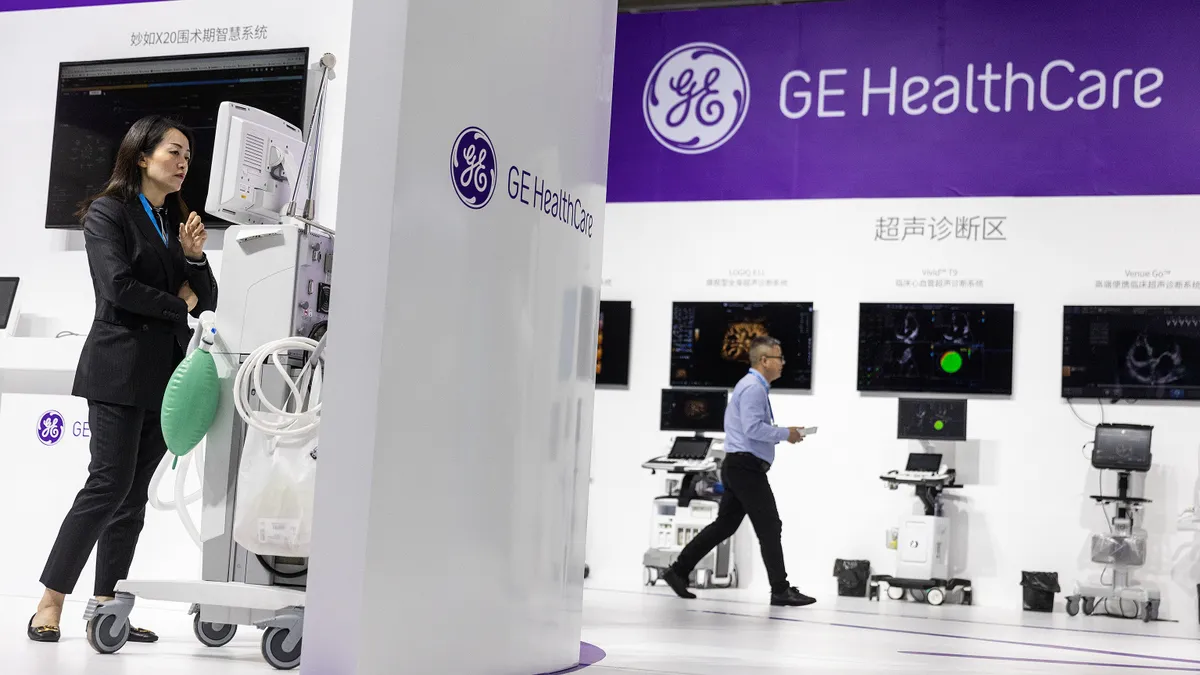A week after declaring “Liberation Day” and levying hefty tariffs on most of the country’s trading partners, President Donald Trump reversed course on Wednesday, announcing he will pause most reciprocal tariffs for 90 days.
On its face, the pause is good news for the healthcare industry, as it offers companies some breathing room in which to make supply chain adjustments, analysts told Healthcare Dive.
However, analysts cautioned that the pause won’t last forever, and said providers and medtech companies remain under urgent pressure to reconsider their supply chains.
“The situation right now, this moment, is better than it was 24 or 36 hours ago, but there's still plenty of gray clouds,” said Mark Pascaris, senior director and analytic lead of nonprofit healthcare at Fitch Ratings.
The analyst said the president’s increasingly aggressive stance toward trade with China and interest in adding tariffs to pharmaceuticals are imminently weighing on hospital operators. On Thursday, the president clarified that tariffs on China now sit at 145%, according to a report from the New York Times.
And while the pause has offered healthcare companies a reprieve from most tariffs, it did not clarify the administration’s ultimate position on international trade. In a note published Thursday, analysts from research firm Ing said the move “once again upends any pretence that we understand [Trump’s] strategy.”
“Regardless of the pause, the last week clearly sent signals to those operating healthcare services that they need to be digging deep and analyzing their readiness to come out on the other side,” said Tyler Giesting, director of healthcare merger and acquisition at West Monroe.
Planning for the long haul
Fitch’s Pascaris said tariffs could force healthcare operators to reconsider strategy.
“A well-run hospital system in good times, stable times, generates an operating margin of 3% to 4%,” Pascaris said.
Many health systems won’t have a cushion to absorb significant excess supply costs, meaning heightened expenses will appear across health systems’ balance sheets, Pascaris said. For example, tariffs are likely to drive up the cost of raw materials like steel and aluminum — which are critical for health systems’ construction projects.
“There will be some health systems that defer projects, down-scope projects, or plan to a budget,” the analyst said, “and if things cost more then maybe the big, new ambulatory center that we're going to build is going to be slightly less big.”
Other health systems could attempt to cut spending elsewhere to offset rising supply costs, said West Monroe’s Giesting.
The consultant said he’s seen a rise in health systems pursuing administrative workforce reductions or outsourcing in recent years to find incremental savings.
“Little pieces that used to be in-house are getting carved out to find any degrees of savings,” Giesting said. While two years ago, health systems were allocating those additional funds to pay for heightened labor costs, now health systems could set aside the money as a rainy day fund for supplies.
Tariffs could be a "catalyst" for hospital M&A as health systems attempt to merge with larger providers in a bid for efficiency at scale, said Pascaris.
“We know that a lot of health systems out there, they're talking to each other,” Pascaris said. “We were already in an environment where there was a premium on developing scale and scope.”
One thing that providers will not do, Giesting said, is reshore their supply chains.
“If you’re a provider, it’s hard to look past the margin pressure they face… [especially as] there are other headwinds they face on the reimbursement side,” Giesting said. “I do not think, and would not expect, hospital executives to prioritize purchasing from a domestic supplier. I still think they’re going to look for the best cost.”
Push for exemptions
Industry groups also haven’t given up on securing exemptions from the tariffs.
AdvaMed and the AHA have repeatedly lobbied the Trump administration for exemptions, citing concerns about financial strain from tariffs and possible supply shortages.
The organizations have sounded the alarm for months about how tariffs might strain supply chains for critical medical supplies and devices.
AdvaMed and nine other healthcare groups, including America’s Essential Hospitals, sent a letter to U.S. Trade Representative Jamieson Greer on April 1 reiterating those concerns, detailing how the tariffs could cause higher costs for devices and dental equipment.
“This ultimately places further financial pressure on providers, hospitals, and health systems, particularly those located in rural and medically underserved areas,” they wrote.
The letter cited a Black Book Market Research survey that found 80% of 200 industry professionals expected costs for hospitals and health systems to rise at least 15% in the next six months due to increased import costs.
Further financial pressure on health systems from higher supply costs could create longer wait times and reduce access to treatment while impeding innovation and efforts to improve patient outcomes, the groups said.
AdvaMed is currently advocating for “zero for zero” tariffs on medical devices with all key trading partners, AdvaMed CEO Scott Whitaker said, and will continue to work with the president and his senior team to “ensure the unique role of the medtech industry is protected.”
The AHA says it will “work with the Administration and others to make sure hospitals have the devices and supplies they need to continue caring for their communities.”




















